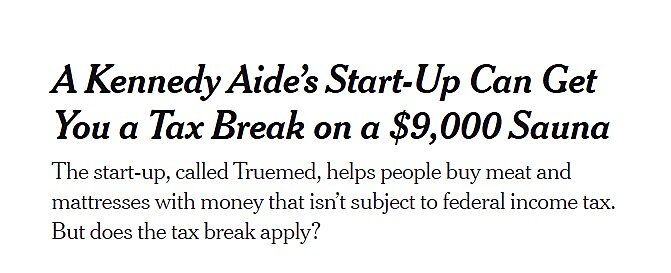The New York Times has a fun article on the absurdity of the income tax. Superficially, of course, it is about greedy MAHA Republicans bending the tax laws to make a buck. But fundamentally, it’s about how taxes spur unproductive activities to avoid the tax. It’s also a good example of how academics and reporters (perhaps inadvertently) smuggle ideology into news reports.
Before Calley Means was a special government employee in the Trump administration, he co-founded a company (Truemed) that helps people pay for things using flexible spending account (FSA) or health savings account (HSA) funds. Those accounts allow people to purchase qualified medical expenses with pre-tax dollars. The Times explains that this is equivalent to a price discount of “roughly 30 percent.” Truemed has provided “letters of medical necessity,” enabling customers to claim the following items as qualified medical expenses:
- Bone broth powder
- Headphones & earbuds
- Hot dogs
- Mixed-martial-arts classes
- Kettlebells
- Red-light masks
- Peloton stationary bikes
- Saunas
- Massage balls
- Cold-plunge pools
- Alarm clocks
- Ground beef
- Water filters
- Zwift bikes
- Protein powder
- Tushy-brand bidets
Truemed is what doctors think prior authorization should be.
The company’s responses to the Times are inadvertently hilarious. The Times wrote that Truemed said, “Its medical evaluation process was as robust as that of companies selling prescription drugs online.” Oh. Truemed wrote that it uses “the same compliant process followed by reputable telehealth providers.”
Why are people claiming bone broth powder and bidets are medical expenses? Because they are trying to avoid a penalty.
Almost immediately after Congress created the current federal income tax in 1913, Treasury bureaucrats excluded employer-sponsored health insurance (ESI) from the new tax. For more than a century since then, the federal tax code has effectively penalized workers for every dollar they don’t spend on ESI. As I explain in the study, “End the Tax Exclusion for Employer-Sponsored Health Insurance,” that one feature made the income tax so inequitable and economically distortionary that it is fair to say that the federal income tax has wrecked the US health sector.
Every tax spurs efforts to create special exemptions. Creating a tax preference (e.g., an exclusion, deduction, exemption, or credit) requires lawmakers to define which economic activities qualify for that preference. The tax exclusion for ESI required lawmakers to define ESI and what items ESI may legitimately purchase.
For as long as the tax exclusion for ESI has existed, consumers, industry, employers, and lawmakers have sought to expand it, because doing so spares more economic activity from the income tax’s implicit penalties. That’s what Congress did when it applied the exclusion to the portion of ESI premiums that employees pay directly, to FSA deposits, to Archer medical savings account (MSA) deposits, to health reimbursement arrangements (HRAs), and to HSA deposits. It’s what Congress did in the recent budget when it expanded the exclusion to apply to HSA deposits by people with more types of health insurance (direct primary care memberships and bronze or catastrophic Obamacare plans). In each case, lawmakers exempted even more economic activity from the income tax’s implicit penalties on non-excludable uses of income.
Say what you will about Truemed. The company may or may not be crooked. But it is following the same incentives as the lobbyists and lawmakers. It is trying to save people from unnecessary, stupid, and harmful penalties that the government created. Truemed is not the reason the phrase “genital-tract secretions” appears in the Internal Revenue Code, of all places, nor why the government must now decide whether hot dogs are medicine. For that, blame a government that created an income tax and has let it continue to create gaps in the nation’s health sector for more than 100 years.
The Times article’s shortcoming is its failure to convey this larger picture. Instead, it lays blame at just one of Congress’s attempts to help people avoid these penalties—HSAs—and relies on just one Clinton/Obama appointee to provide ideological cover—I mean, economic context. (What’s that? You want to highlight the distributional effects of HSAs without mentioning the exclusion’s underlying distributional effects? Woah, didn’t see that coming.)
The damage that the second federal income tax has done to health care is reason enough to let it go the way of the first.























